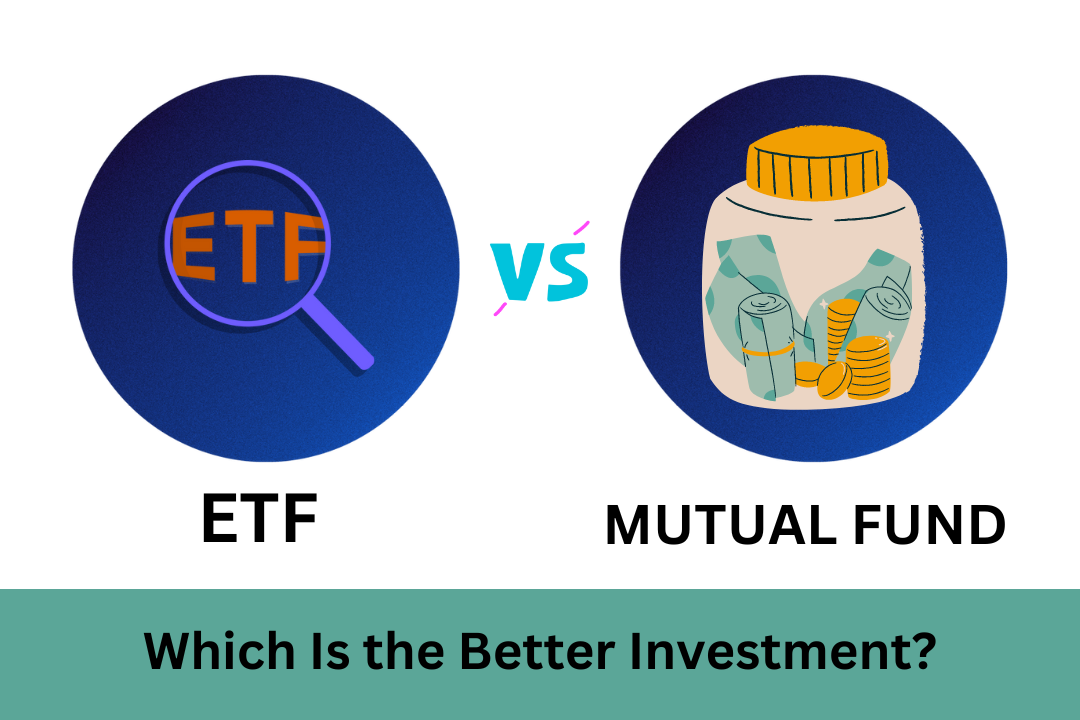ETF vs Mutual Fund : Exchange-Traded Funds (ETFs) and Mutual Funds are two of the most popular options for both novice and seasoned investors. While they share similarities, including pooling investors’ money to create a diversified portfolio, there are critical differences between the two. Understanding these differences is crucial in determining which investment vehicle may be better suited to your financial goals.
Understanding ETFs and Mutual Funds
What is an ETF?
An Exchange-Traded Fund (ETF) is a type of investment fund and exchange-traded product, meaning it is traded on stock exchanges. ETFs are designed to track the performance of a specific index, commodity, or a basket of assets, similar to an index fund. Investors can buy and sell shares of an ETF throughout the trading day, just like a stock. This flexibility makes ETFs highly liquid, allowing investors to react quickly to market movements.
What is a Mutual Fund?
A Mutual Fund is an investment vehicle that pools money from multiple investors to purchase a diversified portfolio of stocks, bonds, or other securities. Mutual funds are managed by professional portfolio managers who make decisions on the buying and selling of securities within the fund. Unlike ETFs, mutual fund shares are not traded on an exchange; instead, they are bought and sold directly from the fund at the end of the trading day, based on the fund’s net asset value (NAV).
Key Differences Between ETFs and Mutual Funds
1. Trading Flexibility and Liquidity
One of the most significant differences between ETFs and mutual funds is how they are traded. ETFs can be bought and sold throughout the trading day, giving investors the ability to enter and exit positions at any time. This intraday trading flexibility can be particularly beneficial in volatile markets where prices fluctuate rapidly.
Mutual funds, on the other hand, can only be traded at the end of the trading day. Investors place their orders during the day, but the transaction is executed at the fund’s NAV at the market’s close. This lack of intraday trading can be a disadvantage for investors who want to respond quickly to market changes.
2. Management Style: Active vs. Passive
Another critical difference is the management style. ETFs are typically passively managed, meaning they aim to replicate the performance of a specific index or sector rather than outperform it. This passive management often results in lower management fees and expenses, making ETFs a cost-effective option for investors looking for broad market exposure.
Mutual funds, in contrast, are usually actively managed. Portfolio managers actively select securities with the goal of outperforming the market. While active management offers the potential for higher returns, it also comes with higher fees, which can eat into the investor’s profits over time.
3. Cost Structure
The cost structure of ETFs and mutual funds differs significantly. ETFs are generally known for their low expense ratios, which are the annual fees charged by the fund to cover operating expenses. Since ETFs are passively managed, these fees are often lower compared to mutual funds.
Mutual funds tend to have higher expense ratios due to the active management involved. In addition to management fees, mutual funds may also charge other fees, such as load fees (sales commissions), which can be front-end (charged when you buy) or back-end (charged when you sell). These costs can add up, making mutual funds more expensive in the long run.
4. Tax Efficiency
Tax efficiency is another area where ETFs have an advantage over mutual funds. ETFs are more tax-efficient because of their unique structure. When investors sell their shares, they usually do so on the open market without triggering capital gains taxes for other investors in the fund. Additionally, the “in-kind” creation and redemption process of ETFs allows fund managers to minimize capital gains distributions.
Mutual funds, however, can be less tax-efficient. When a portfolio manager sells securities within the fund to rebalance or meet redemptions, it can trigger capital gains, which are then passed on to the investors. This can result in unexpected tax liabilities, even for investors who haven’t sold their shares.
5. Minimum Investment Requirements
Minimum investment requirements can also vary between ETFs and mutual funds. ETFs typically have no minimum investment, allowing investors to purchase as few as one share. This feature makes ETFs accessible to a broader range of investors, including those with limited capital.
Mutual funds, on the other hand, often require a minimum investment, which can range from a few hundred to several thousand dollars. This requirement can be a barrier for some investors, particularly those just starting out.
6. Type of ETFs and Mutual Funds
Types of ETFs
ETFs come in various types, including:
- Index ETFs: Track a specific index.
- Sector and Industry ETFs: Focus on particular industries like technology or healthcare.
- Commodity ETFs: Invest in commodities like gold or oil.
- Bond ETFs: Hold a portfolio of bonds.
- International ETFs: Provide exposure to markets outside the U.S.
Types of Mutual Funds
There are several types of mutual funds, including:
- Equity Funds: Invest primarily in stocks.
- Bond Funds: Focus on bonds and other debt instruments.
- Money Market Funds: Invest in short-term, low-risk securities.
- Balanced Funds: Combine stocks and bonds for a balanced risk-return profile.
- Index Funds: Track a market index, similar to index ETFs.
Which is the Better Investment?
The decision between ETFs and mutual funds ultimately depends on your investment goals, risk tolerance, and personal preferences.
- If you value flexibility and low costs, ETFs may be the better choice. Their intraday trading capability, tax efficiency, and lower expense ratios make them attractive for investors who want to manage their portfolios actively or passively without incurring high fees.
- If you prefer professional management and are willing to pay higher fees for the potential of higher returns, mutual funds might be more suitable. The active management of mutual funds offers the possibility of outperforming the market, which can be appealing to investors looking for above-average returns.
- For long-term investors who want to set and forget, mutual funds might be the right choice, especially if you find a fund with a strong track record and a management team you trust.
- For those seeking broad market exposure at a low cost, ETFs are typically the way to go. Their structure makes them more cost-effective and tax-efficient, which can be advantageous over the long term.
Conclusion
Both ETFs and mutual funds offer unique advantages and disadvantages. Understanding these differences is key to making an informed decision about which investment vehicle aligns best with your financial objectives. By carefully considering factors such as trading flexibility, management style, costs, tax efficiency, and minimum investment requirements, you can choose the option that will best help you achieve your investment goals.
Visit again financestock.in and subscribe for the latest updates llike a 10 Ways to Earn RS 500 Per Day Without Investment


1 thought on “ETF vs Mutual Fund: Which Is the Better Investment?”